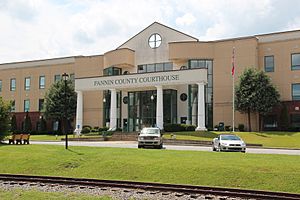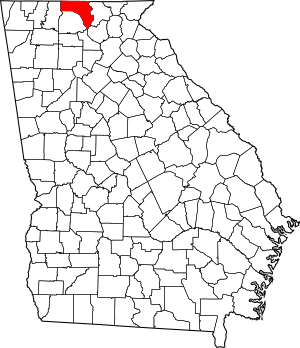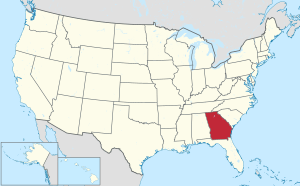Fannin County, Georgia facts for kids
Quick facts for kids
Fannin County
|
||
|---|---|---|

Fannin County Courthouse in Blue Ridge
|
||
|
||

Location within the U.S. state of Georgia
|
||
 Georgia's location within the U.S. |
||
| Country | ||
| State | ||
| Founded | 1854 | |
| Named for | James Fannin | |
| Seat | Blue Ridge | |
| Largest city | Blue Ridge | |
| Area | ||
| • Total | 392 sq mi (1,020 km2) | |
| • Land | 387 sq mi (1,000 km2) | |
| • Water | 5.2 sq mi (13 km2) 1.3%% | |
| Population
(2020)
|
||
| • Total | 25,319 | |
| • Density | 65/sq mi (25/km2) | |
| Time zone | UTC−5 (Eastern) | |
| • Summer (DST) | UTC−4 (EDT) | |
| Congressional district | 9th | |
Fannin County is a county located in the north central portion of the U.S. state of Georgia. As of the 2020 census, the population was 25,319. It is one of the most rural counties in Georgia due its location in the Appalachian Mountain Range, with about 90% of the population of Fannin County living in unincorporated lands. The county seat and largest city is Blue Ridge. The county was created on January 21, 1854, and is named after James Fannin, a veteran who fought in the Texas Revolution.
Contents
History
Prior to European colonization, the area that is now Fannin County was inhabited by the Cherokee people and other Indigenous peoples for thousands of years.
Fannin County was founded on January 12, 1854, taken from 396 square miles that were previously part of Gilmer and Union counties. The county is named for Georgia native James W. Fannin, who fought and died during the Texas Revolution.
Although the county was majority pro-secession at the beginning of the Civil War, wartime conditions inspired a notable number of anti-Confederate "Tories" as early as 1862, many of whom re-located to pro-Union areas of Tennessee for the duration. This contributed to the postwar establishment of a countywide Republican Party earlier and more sustained than almost any other county in Georgia.
Geography
According to the U.S. Census Bureau, the county has a total area of 392 square miles (1,020 km2), of which 387 square miles (1,000 km2) is land and 5.2 square miles (13 km2) (1.3%) is water. The county is located in the Blue Ridge Mountains.
The Toccoa River, which rises in adjacent Union County, flows northward across Fannin County into Tennessee, where it becomes the Ocoee River. Blue Ridge Lake, created in the 1930s by the completion of Blue Ridge Dam (now operated by the Tennessee Valley Authority), spans a substantial stretch of the river in the northern part of the county.
The vast majority of Fannin County is located in the Ocoee River sub-basin of the Middle Tennessee-Hiwassee basin. A very small northeastern portion of Fannin County is located in the Hiwassee River sub-basin of the same Middle Tennessee-Hiwassee basin. Illustrating that watershed boundaries and county boundaries have little in common, Fannin County's southernmost corner is located in the Etowah River sub-basin in the ACT River Basin (Coosa-Tallapoosa River Basin), while two slivers of the county's southwestern area are located in the Coosawattee River sub-basin of the same larger ACT River Basin. Finally, a western portion of the county is located in the Conasauga River sub-basin of the ACT River Basin.
Adjacent counties
- Cherokee County, North Carolina - northeast
- Union County - east
- Dawson County - southeast
- Lumpkin County - southeast
- Gilmer County - southwest
- Murray County - west
- Polk County, Tennessee - north
National protected area
- Chattahoochee National Forest (part)
Transportation
Major highways
Secondary highways
- Old U.S. Highway 76 Also Old S.R. 2
- Loving Road
- Old S.R. 2
- Aska Road
- Madola Road
- Lebanon Road
- Mobile Road
- Curtis Switch Road
- Galloway Road
- Doublehead Gap Road
- Skeenah Gap Road
Demographics
| Historical population | |||
|---|---|---|---|
| Census | Pop. | %± | |
| 1860 | 5,139 | — | |
| 1870 | 5,429 | 5.6% | |
| 1880 | 7,245 | 33.4% | |
| 1890 | 8,724 | 20.4% | |
| 1900 | 11,214 | 28.5% | |
| 1910 | 12,574 | 12.1% | |
| 1920 | 12,103 | −3.7% | |
| 1930 | 12,969 | 7.2% | |
| 1940 | 14,752 | 13.7% | |
| 1950 | 15,192 | 3.0% | |
| 1960 | 13,620 | −10.3% | |
| 1970 | 13,357 | −1.9% | |
| 1980 | 14,748 | 10.4% | |
| 1990 | 15,992 | 8.4% | |
| 2000 | 19,798 | 23.8% | |
| 2010 | 23,682 | 19.6% | |
| 2020 | 25,319 | 6.9% | |
| 2023 (est.) | 25,955 | 9.6% | |
| U.S. Decennial Census 1790-1880 1890-1910 1920-1930 1930-1940 1940-1950 1960-1980 1980-2000 2010 2020 |
|||
2020 census
| Race / Ethnicity (NH = Non-Hispanic) | Pop 2000 | Pop 2010 | Pop 2020 | % 2000 | % 2010 | % 2020 |
|---|---|---|---|---|---|---|
| White alone (NH) | 19,312 | 22,761 | 23,351 | 97.55% | 96.11% | 92.23% |
| Black or African American alone (NH) | 22 | 75 | 85 | 0.11% | 0.32% | 0.34% |
| Native American or Alaska Native alone (NH) | 88 | 68 | 85 | 0.44% | 0.29% | 0.34% |
| Asian alone (NH) | 47 | 72 | 113 | 0.24% | 0.30% | 0.45% |
| Pacific Islander alone (NH) | 1 | 6 | 3 | 0.01% | 0.03% | 0.01% |
| Other race alone (NH) | 1 | 17 | 55 | 0.01% | 0.07% | 0.22% |
| Mixed race or Multiracial (NH) | 197 | 252 | 874 | 1.00% | 1.06% | 3.45% |
| Hispanic or Latino (any race) | 130 | 431 | 753 | 0.66% | 1.82% | 2.97% |
| Total | 19,798 | 23,682 | 25,319 | 100.00% | 100.00% | 100.00% |
As of the 2020 United States census, there were 25,319 people, 10,408 households, and 7,083 families residing in the county.
2010 census
As of the 2010 United States Census, there were 23,682 people, 10,187 households, and 7,016 families living in the county. The population density was 61.2 inhabitants per square mile (23.6/km2). There were 16,207 housing units at an average density of 41.9 units per square mile (16.2 units/km2). The racial makeup of the county was 97.1% white, 0.4% black or African American, 0.3% Asian, 0.3% American Indian, 0.7% from other races, and 1.2% from two or more races. Those of Hispanic or Latino origin made up 1.8% of the population. In terms of ancestry, 18.6% were Irish, 13.3% were American, 11.5% were English, and 9.5% were German.
Of the 10,187 households, 25.1% had children under the age of 18 living with them, 55.2% were married couples living together, 9.5% had a female householder with no husband present, 31.1% were non-families, and 27.1% of all households were made up of individuals. The average household size was 2.31 and the average family size was 2.77. The median age was 48.3 years.
The median income for a household in the county was $34,145 and the median income for a family was $41,422. Males had a median income of $34,875 versus $27,097 for females. The per capita income for the county was $21,103. About 12.2% of families and 16.2% of the population were below the poverty line, including 23.0% of those under age 18 and 13.8% of those age 65 or over.
Communities
Cities
Census-designated places
- Epworth
- Mineral Bluff (incorporated until 1995)
Unincorporated communities
- Hemptown
- Aska
See also
 In Spanish: Condado de Fannin (Georgia) para niños
In Spanish: Condado de Fannin (Georgia) para niños



